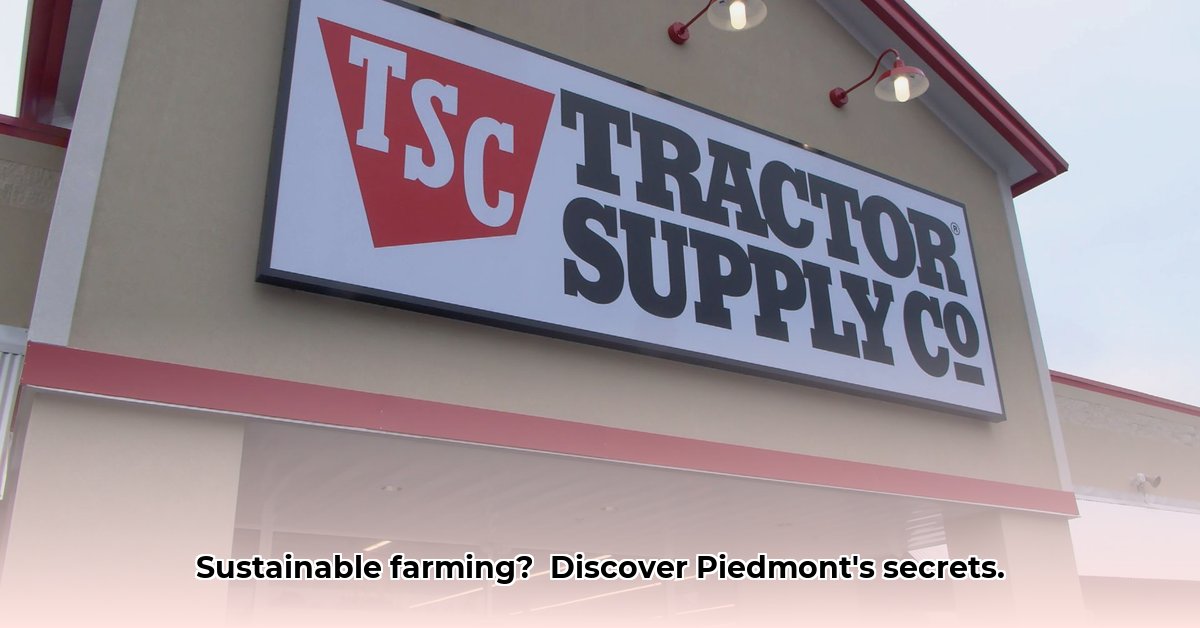
A Critical Look at Piedmont Tractor Supply's Role in Sustainable Agriculture
Piedmont Tractor Supply (PTS) serves as a vital resource for local farmers and gardeners, providing essential supplies ranging from seeds and fertilizers to equipment. For more information on professional agricultural plans, see the PTS Pro Plan. However, its contribution to sustainable agriculture requires a closer examination, moving beyond readily apparent benefits to a thorough assessment of its practices and impacts. This investigation explores both PTS's positive contributions and its significant shortcomings, highlighting the need for greater transparency and proactive steps toward more sustainable operations.
PTS's Current Impact: A Mixed Bag
PTS undeniably supports local agriculture, providing convenient access to tools and materials crucial for food production. This readily apparent benefit is vital to the region's agricultural economy. However, the extent to which these supplies contribute to sustainable farming is less clear. The sheer volume of goods sold, coupled with a lack of readily available information regarding sourcing and environmental impact, raises serious questions about PTS's overall sustainability performance. How many of their products align with genuinely sustainable practices? What is PTS's own environmental footprint? These are critical questions demanding answers.
Transparency Gaps: Unanswered Questions Hinder Assessment
A major impediment to evaluating PTS's role in sustainable agriculture is a significant lack of transparency. Crucial information regarding the sourcing of their products remains unavailable to the public. Are seeds organically grown? What are the environmental impacts of their fertilizers? How do they account for packaging waste and transportation emissions? This opacity hinders a complete assessment and leaves consumers and stakeholders uncertain about the true environmental costs associated with PTS products. Without this crucial information, it's impossible to fully evaluate their commitment to sustainable agriculture.
A Roadmap for Improvement: Actions PTS Can Take
PTS has the opportunity to become a leader in sustainable agriculture within the Piedmont community. Achieving this requires a multi-faceted approach focusing on both immediate actions and a long-term vision of sustainable business practices.
Short-Term Actions (Within 1 Year):
Transparent Product Labeling: Implement a clear system of labeling products based on their sustainability credentials (organic, sustainable sourcing, reduced-impact packaging, etc.). This would empower consumers to make informed choices, promoting demand for truly sustainable products.
Supply Chain Disclosure: Publicly disclose the origin and production methods of key products, including information about the farmers and suppliers they work with. This transparency would foster trust and accountability. Third-party verification of claims would further enhance credibility.
Employee Education and Training: Provide comprehensive training on sustainable farming practices for all sales staff. Educated employees are better equipped to advise customers and promote responsible choices.
Long-Term Vision (Beyond 1 Year):
Annual Sustainability Report: Publish an annual sustainability report detailing their environmental impact, including carbon emissions, waste generation, water usage, and supply chain sustainability. This report should be verified by an independent third party.
Community Partnerships: Collaborate with local organizations dedicated to sustainable agriculture, sharing expertise and resources for mutually beneficial outcomes. This could include joint educational programs or collaborative initiatives.
Expansion of Sustainable Product Offerings: Significantly expand the range of organic and sustainably produced products offered, meeting the growing consumer demand for eco-friendly choices.
Consumer Power: Driving Change Through Informed Choices
Consumers have a critical role to play in shaping the future of sustainable agriculture. By demanding transparency and actively choosing sustainable products, consumers can directly influence the market. Careful examination of product labels, asking questions about sourcing, and supporting businesses committed to transparency are vital steps. These actions collectively increase pressure on companies like PTS to prioritize sustainable practices.
The Local Impact: A Stepping Stone to Broader Change
While PTS's immediate impact is localized, its actions have broader implications. Its commitment to sustainability, or lack thereof, sets a precedent for other businesses and influences the overall agricultural landscape. Promoting sustainability at the local level is a foundational step toward wider positive change.
Conclusion: A Call for Action
Piedmont Tractor Supply's future is inextricably linked to the future of sustainable agriculture. The potential for positive environmental impact is substantial. The challenge lies not in the possibility of change but in the urgency of action. PTS must embrace transparency, invest in sustainable practices, and actively engage with its community to fulfill its potential as a driving force for sustainable agriculture within the Piedmont region. The time for decisive action is now.